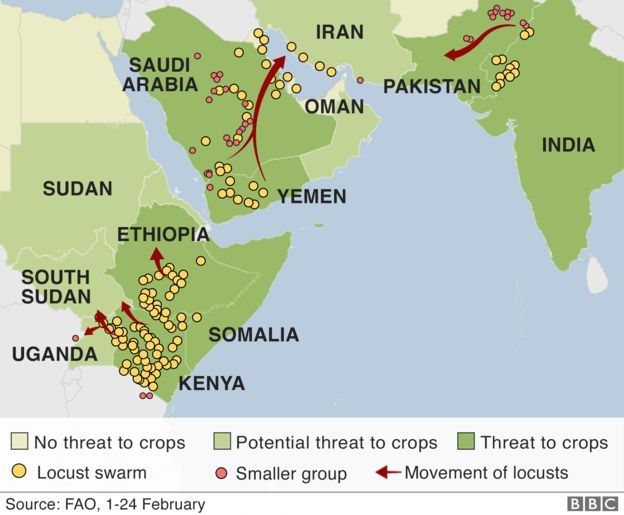Appeal for more funds to help Africa stop locust swarms
The UN's Food and Agriculture Organization (FAO) says a food crisis could be looming in East Africa if more resources are not forthcoming, and has appealed to donors for an additional $62m (£48m).
Director general Qu Dongyu says the next few weeks will be critical.
Control operations against locusts are under way in 13 countries, from India in the east, all the way across to Mauritania in West Africa.
The main threats are in East Africa and Yemen, as well the Gulf states, Iran, Pakistan and India.
Most recently, locusts have been seen in the Democratic Republic of Congo, and swarms have arrived in Kuwait, Bahrain and Qatar, and along the coast of Iran.
The FAO has told us that in three of the worst affected countries, Kenya, Ethiopia and Somalia, they estimate that at least 100,000 hectares in each country need to be sprayed with insecticide.
By the end of January, they were substantially short of this target in the worst affected countries in East Africa.
Equipment and personnel for controlling the locusts are key resources that are currently in short supply.
Vehicles, planes, personal safety equipment, radios, GPS units and camping equipment are badly needed.
Aerial and ground spraying combined with constant tracking of the swarms - which are constantly on the move - are viewed as the most effective strategies.
Stephen Njoka, head of the Desert Locust Control Organization for Eastern Africa, the regional body co-ordinating the fight against the locusts, told us: "We have a challenge in the number of aircraft available - there are not enough. Pesticides are also in short supply."
He says currently Ethiopia is using five aircraft, and Kenya, six for spraying, and four for surveying.
The Kenyan government says it needs 20 planes to tackle the crisis.
It also needs a continuous supply of the pesticide Fenitrothion for spraying.
Peter Munya, of the Kenyan Agriculture Ministry, says they are having to source pesticides from Japan.
A month ago, the Kenyan government said it had distributed 4,700 litres of pesticide to affected areas and wanted to distribute 20,000 litres more.
Mr Munya said earlier last week the government had received a first consignment of 7,500 litres from abroad, but that is only just over a third of what's needed.
Somalia is not currently carrying out spraying. The government there - along with the FAO in Somalia - has called for an urgent upscaling of surveillance and control operations in the country.
The FAO also says that in Yemen, there've so far been limited surveys of the situation and control operations could not be carried out.
Related Posts

